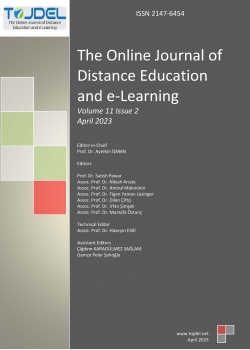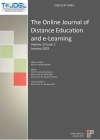TOJDEL - Volume 11 - Issue 2c - April 2023
 A Comparative Study of Management Education in India and Abroad
A Comparative Study of Management Education in India and Abroad Nilesh R. Berad
Abstract:
This comparative study aims to examine the similarities and differences between management
education in India and abroad from the perspectives of students. The study considers a sample
of 200 students out of which 100 students are from abroad and 100 are from Indian educational
institutions. The study focuses on five key areas, namely curriculum, faculty, pedagogy,
infrastructure, and industry connections. The study finds that while the curriculum in both
systems is similar, the approach to teaching, quality of faculty, pedagogy, infrastructure, and
industry connections differ significantly. The study recommends bridging the gap between
management education in India and abroad to provide students with a more practical and
holistic learning experience. The study also highlights the need for more industry connections
in India to expose students to real-life scenarios and challenges. Overall, this study provides
valuable insights into the strengths and weaknesses of management education in India and
abroad, and the need for improvement in certain areas to prepare students for the challenges of
the global business environment.
 A Review of Literature on Green Human Resource Practices in It Industry
A Review of Literature on Green Human Resource Practices in It Industry Saylee Anil Karande, Naim Shaikh
Abstract:
Going green is a huge trend right now. The field of human resource management is also true
of this. Therefore, top management in any sector has become interested in green human
resource management. Paper discusses the Green Human Resource practices in the IT Industry.
Also discuss the benefits of GHRM. This study aims to pinpoint the variables influencing green
human resource management. Various literature has been studied for finding out the factors for
barriers of green HRM.
 A Study Of Influencing Factors Of GHRM Practices In The IT Industry
A Study Of Influencing Factors Of GHRM Practices In The IT Industry Saylee Anil Karande, Naim Shaikh
Abstract:
Green HRM executives as an idea are acquiring truly expanding significance. It wouldn't be
inappropriate to say that administrative adequacy helps upgrade authoritative execution and foster
hierarchical societies that cultivate advancement and adaptability. The Indian IT Industry is
confronting some serious Green HR-related issues. As a matter of fact, one can see the adverse
consequence of Green HR-related issues in each Industry and, the Pune IT Industry is the same.
According to the Green HR point of view, administrative viability is a significant idea that has
drawn-out holding on for Green Discipline Management & Employee Relations. This paper means
to test the effect of administrative viability on authoritative capabilities. It additionally attempts to
concentrate on the connection of Green Recruitment, Green Selection, Green Training &
Development, and Green Performance & Reward Management.
 A STUDY OF MACHINE LEARNING FRAMEWORK FOR SENTIMENT ANALYSIS IN FINANCIAL SECTOR
A STUDY OF MACHINE LEARNING FRAMEWORK FOR SENTIMENT ANALYSIS IN FINANCIAL SECTOR Swati Jadhav, Manisha Kumbhar, Kalyani Sahastrabuddhe
Abstract:
Sentiment analysis has emerged as a crucial tool in understanding and predicting market behaviour by
analysing emotions and opinions expressed in textual data. The financial sector, in particular, heavily
relies on accurate sentiment analysis to make informed investment decisions. The research aims to
develop a comprehensive machine learning framework that leverages sentiment analysis techniques to
provide valuable insights into the financial market sentiment. Sentiment analysis, a branch of natural
language processing, has gained significant attention in the financial sector for its potential to extract
sentiments and opinions from textual data. This paper presents a comprehensive study of machine
learning frameworks utilized for sentiment analysis in the financial sector. We explore various sentiment
analysis techniques, the integration of financial indicators, and the application of machine learning
algorithms to predict market behavior.
 A STUDY ON IMPACT OF GOVERNMENT SOCIAL SCHEMES IN THE HEALTH CARE SECTOR IN INDIA –FINDINGS, CONCLUSION, AND SUGGESTIONS
A STUDY ON IMPACT OF GOVERNMENT SOCIAL SCHEMES IN THE HEALTH CARE SECTOR IN INDIA –FINDINGS, CONCLUSION, AND SUGGESTIONS Prasad A Kajale, Shripad Joshi
Abstract:
According to agency research, there is a huge market opportunity in the Indian healthcare industry. They have drawn attention to the fact that despite India having one of the lowest health insurance costs, a sizable portion of the population remains uninsured. There is no denying that, especially in rural and semi-urban areas, the current awareness level and penetrations are quite low. A study was conducted to examine the macro and micro effects of several government social programmes on the Indian health care industry. It was necessary to evaluate the impact on market penetration overall, customer segmentation, consumer behaviour, supply-side considerations including prices, and issues with the current goods and services. Maharashtra and Karnataka each had 400 beneficiaries surveyed. This essay offers the study's findings, conclusions, and recommendations.
 Advertising Strategies Adopted by Multinational Companies in Sports Events and Its Impact on Consumer Psychology
Advertising Strategies Adopted by Multinational Companies in Sports Events and Its Impact on Consumer Psychology Nandini Desai, Shivaji Tukaram Mane, Aatish Zagade
Abstract:
This study examines the advertising strategies adopted by multinational companies in sports events and their impact on consumer psychology. The research focuses on the Indian market, specifically focusing on Pune City. The study's objectives are to explore the relationship between exposure to advertising strategies and brand loyalty and to analyze the effectiveness of these strategies in the Indian context compared to the global perspective.
A cross-sectional approach uses qualitative interviews to gather data from 400 respondents. The findings indicate that consumers exposed to advertising strategies in sports events exhibit higher brand loyalty than those not exposed. The study also reveals that the effectiveness of these strategies varies between the Indian market and the global perspective, suggesting the importance of cultural and market dynamics.
The implications of these findings highlight the significance of well-executed advertising strategies in sports events for multinational companies aiming to engage consumers and shape their purchasing decisions. The study contributes to understanding consumer behaviour and provides insights for marketers in developing effective advertising campaigns in the sports event domain.
 An In-Depth Analysis of Threats and Countermeasures in the Period of Digital Transformation for Cyber security
An In-Depth Analysis of Threats and Countermeasures in the Period of Digital Transformation for Cyber security Sujata Roychowdhury
 An Overview of Non-Financial Reporting Practices around the world
An Overview of Non-Financial Reporting Practices around the world Vikrant Kelkar, Hemant J. Katole
 Challenges and Risks for Retail Central Bank Digital Currency (CBDC) in India
Challenges and Risks for Retail Central Bank Digital Currency (CBDC) in India Smita Pachare, Sheetal Umbarkar, Samadhan Bhikaji Jadhav
 Challenges faced by Start-ups in adoption of Digital marketing and E-Commerce platforms
Challenges faced by Start-ups in adoption of Digital marketing and E-Commerce platforms Sujeet Naik, Sachin Ayarekar, Arati Naik
 ESG Investing – Building Awareness Towards Sustainable Future
ESG Investing – Building Awareness Towards Sustainable Future Ruchi Prabhu, Anuradha Yesugade
 FACTORS AFFECTING IN LEARNING MATHEMATICS THROUGH MULTIMEDIA TECHNOLOGY IN SECONDARY SCHOOLS STUDENTS
FACTORS AFFECTING IN LEARNING MATHEMATICS THROUGH MULTIMEDIA TECHNOLOGY IN SECONDARY SCHOOLS STUDENTS S. Saraswathi, K. Nachimuthu
 Impact of Accreditation on Quality and Excellence of Management Institutions in India
Impact of Accreditation on Quality and Excellence of Management Institutions in India Ashutosh Narayan Misal, Kunte B, Mangalgouri S Patil
 Impact of Information and Communication Technology (ICT) tools adopted by Higher Education Institutes on the Development of Students
Impact of Information and Communication Technology (ICT) tools adopted by Higher Education Institutes on the Development of Students Sanjay Dharmadhikari
 IMPACT OF MIDH ON THE HORTICULTURE SECTOR IN INDIA
IMPACT OF MIDH ON THE HORTICULTURE SECTOR IN INDIA Divya Jaiswal, Rajni Mathur, Sameer Sonawane
 Impact of Online Retargeting Advertisements on Consumers Purchase Decision
Impact of Online Retargeting Advertisements on Consumers Purchase Decision Shama Sikandar Mulla
 Impact of Socio-Cultural Factors on Conspicuous Consumption Behaviour of Customers
Impact of Socio-Cultural Factors on Conspicuous Consumption Behaviour of Customers Kunal Patil, Shivaji Tukaram Mane, Shama Sikandar Mulla
 Impact of Technology-Mediated Educational Innovations in Higher Education Institutions
Impact of Technology-Mediated Educational Innovations in Higher Education Institutions Laxman Narayanrao Renapure, Vaishali Jawale, Rohini Pradip Shendkar
 Integration of Banks and Cryptocurrency in a Demonetized World
Integration of Banks and Cryptocurrency in a Demonetized World Debashree Souvik Jana
 Microfinance and Alleviation of Poverty
Microfinance and Alleviation of Poverty Debashree Souvik Jana
 Review of Literature on factors affecting on investment decision in Post office schemes in India
Review of Literature on factors affecting on investment decision in Post office schemes in India Sonali Patil, Prathviraj Halde
 Role of Agricultural Sector in the Development of Indian Economy
Role of Agricultural Sector in the Development of Indian Economy Debashree Souvik Jana
 Role of Artificial Intelligence and Machine Learning in the Development of Banking, Financial Services, and Insurance (BFSI) sector in India
Role of Artificial Intelligence and Machine Learning in the Development of Banking, Financial Services, and Insurance (BFSI) sector in India Vaishali Jawale, Dileep M.Pawar, Nilesh Vitthal Limbore
 Significance of Digital Human Resource Management for Organizational Growth and Development
Significance of Digital Human Resource Management for Organizational Growth and Development Shripada Patil, Dilip Nana Aher, Priyanka Kulkarni
 Skill Development Initiatives for workers in Construction Sector: Challenges and Opportunities
Skill Development Initiatives for workers in Construction Sector: Challenges and Opportunities Sunita Umesh Madhure, Safia Farooqui
 Study on Development of Adaptive and Intelligent web based Educational Systems in India
Study on Development of Adaptive and Intelligent web based Educational Systems in India Vaishali Jawale, Shama Sikandar Mulla, Jyoti Singh
 The Role of Employer Branding Shaping the Future Workplace
The Role of Employer Branding Shaping the Future Workplace Suhas Babasaheb Pakhare, Pramod Shivaji Jadhav, Laxman Narayanrao Renapure
 Theoretical connections between environmental sustainability, corporate social responsibility, and environmental protection
Theoretical connections between environmental sustainability, corporate social responsibility, and environmental protection Aarti Chaprana, Santosh Kumar
 Transformation of Indian Economy through Startups
Transformation of Indian Economy through Startups Deepty Bansal
 Unraveling the Nexus of Occupational Stress and Organizational Effectiveness: A Comprehensive Study
Unraveling the Nexus of Occupational Stress and Organizational Effectiveness: A Comprehensive Study Archana Shrivastava, Praveen Purohit, Ganesh Pandit Pathak
 WOMEN EMPLOYEES’ PERSPECTIVE ON CORPORATE GOVERNANCE EFFECTIVENESS – AN EMPIRICAL STUDY
WOMEN EMPLOYEES’ PERSPECTIVE ON CORPORATE GOVERNANCE EFFECTIVENESS – AN EMPIRICAL STUDY P. Balaji, R.S.M. Jayashree, Kasinglung Panmei


